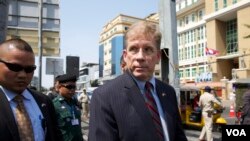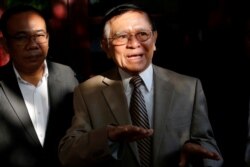Two weeks ago, U.S. Ambassador to Cambodia, W. Patrick Murphy, made a blink-and-you-miss-it appearance at the trial hearing for opposition leader Kem Sokha. Few minutes after arriving, the ambassador left the court premises and made a beeline for the waiting media to deliver a message.
“We’re troubled to see prosecutors introduce fabricated conspiracy theories about the United States,” said Ambassador Murphy.
“Kem Sokha has a well-deserved reputation around world as a champion for rights and freedoms. We look forward to seeing his political rights fully restored, just as we hope that all Cambodians can participate in the political process.”
With this move, observers and analysts said W. Patrick Murphy had set aside his otherwise soft and cordial approach to the Cambodian government, and instead pushed to the forefront the U.S.’s repeated opposition to Kem Sokha’s trial and the consequent indictment of U.S. foreign policy in the country.
Em Sovannara, a Cambodian political commentator, said the ambassador probably felt it was time to set the record straight on the prosecution’s persistent implication that all of Kem Sokha’s activities were secretly and nefariously directed by the U.S.
“The U.S. Ambassador feels compelled to come forward in self-defence with a view that the facts and evidence raised during the trial have been insufficient to press charges against Kem Sokha and his alleged collusion with the U.S. as the main foreign country named in the case,” said Em Sovannara.
The trial has seen the prosecution and council of judges, and occasionally government lawyers, push the narrative that U.S. had orchestrated Kem Sokha’s career trajectory, including the setting up of the Cambodian Center for Human Rights, formation of the Human Rights Party and its merger with the Sam Rainsy Party to form the Cambodia National Rescue Party.
This has included the mention of the International Republican Institute, National Democratic Institute, former country representatives for the previous two organizations, former Secretary of State Hillary Clinton, State Department official Daniel Baer, and major donor for Cambodian projects, USAID, during the protracted trial proceedings.
Em Sovannara said a major point of contention would be the conviction of Kem Sokha, which would in effect indict the U.S. for its engagement in the country, with any potential rapprochement hinging on this outcome.
“This is the largest obstacle in Cambodia’s current state affairs that stakeholders are finding it difficult to find common ground,” he added.
The commentator said there was hope the now-cancelled U.S.-ASEAN Summit this month in Las Vegas would allow for high-level talks between the two governments, and to build on conciliatory moves taken by Ambassador Murphy in Cambodia.
Bong Chansambath, a Fulbright Scholar at the Kansas State University, said Murphy’s appearance at the court was only a “symbolic” gesture but “not substantive” in positioning the U.S.’s outlook on the long-drawn trial.
“This episode is a classic bargaining process, where the U.S. and Cambodian governments each tries to bluff their way and see who will blink first,” Bong Chansambath told VOA Khmer in an email.
“Whether or not he will be able to rehabilitate politically with a royal clemency after the trial is uncertain, though not impossible.”
However, Kem Monovithya, Kem Sokha’s daughter and former CNRP official, said Murphy’s gesture was proof the U.S. would keep pushing back at government’s narrative that the opposition leader had conspired with the U.S. to overthrow the Hun Sen administration.
“We should expect to see more responses going forward if the regime does not drop this,” Kem Monovithya said in an email.
She added the Cambodian government would be boxed-in if it convicted Kem Sokha, pushing the U.S.’s hand on future engagement in the country.
“And the U.S. will also find it unacceptable, which means Cambodia can no longer benefits from what the U.S. can provide to the country,” she added.
Katrin Travouillon, a researcher of Cambodian affairs at the Australian National University, said a conviction of Kem Sokha, based on his career so far, would then associate legitimate activities performed by politicians and rights groups with the government’s interpretation of treason.
"The courts in Cambodia are implementing the agenda of the Cambodian government,” Katrin Travouillon said in an email. “It is in the interest of the government to discredit the value of international rights and norms.”
The U.S. has over the years focussed its funding on health and education programs, but also been a key donor for pro-democracy groups, rights NGOs and even aided political parties, through the IRI and NDI.
“It is further in their interest to promote fear and uncertainty among those, who are actively working for democratization and the protection of human rights in the country,” she added. “The trial of Kem Sokha serves both ends.”





